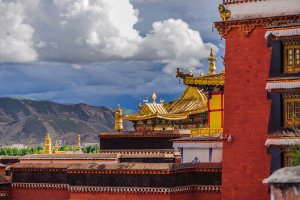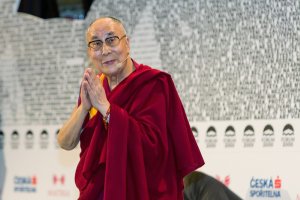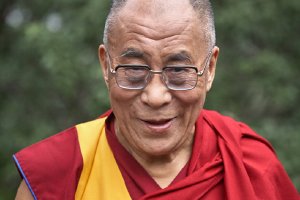His Holiness the Dalai Lama has laid the foundation stone for a forthcoming institution in Bodh Gaya devoted to promoting a more peaceful and compassionate world through the study of the ancient wisdom of Tibet and India. Bodh Gaya is the site in northern India where the Buddha is believed to have gained enlightenment.

The Nobel Peace laureate and spiritual leader of Tibetans worldwide set the foundation stone for the Dalai Lama Center for Tibetan and Ancient Indian Wisdom in January. As Tibetan monks chanted ritual prayers and an array of Indian officials watched, the Dalai Lama examined an architectural prototype of the proposed center.
Supported by both the federal government of India and the state government of Bihar, the upcoming institution is designed to combine education and research with interdisciplinary programs that promote the philosophy and practice of ancient India and Tibet.
In practice, that would mean helping develop loving kindness and compassion as human values in secular rather than religious ways. The center would also advocate for building an international sense of universal responsibility, bolstering interfaith amity, and helping resolve global conflicts nonviolently.
Historically, the various schools of Indian philosophy routinely exchanged ideas, thereby enriching each other, said Professor Samdhong Rinpoche, a Tibetan monk and longtime member of the Tibetan government in exile in Dharamshala, India. Tibet’s philosophical and religious traditions, he added, are based on the same approach, and the center would be a promising venue to help revive the practices.
Tempa Tsering, the project’s interim director and also an official in the Tibetan government in exile, said that at the heart of the center’s creation lies His Holiness’s vision that a greater and wider appreciation of ancient Indian and Tibetan wisdom, particularly regarding the human mind and emotions, would help make the world more peaceful and compassionate.
The center will be open to anyone interested in learning about the ancient philosophies of India and Tibet.
Indian Minister for Law and Justice Kiren Rijiju told attendees that every time he is in Bodh Gaya, he is struck by the Buddha himself having walked on the same land some 2,500 years ago. Just like the Buddha, said Rijiju, the Dalai Lama has shown the world a path to enlightenment.
“His Holiness has made India his home and has committed himself to helping to revive awareness of ancient Indian wisdom,” the minister said. “His Holiness refers to India as the guru and Tibetans as the students, but I say that it is he, an apostle of peace, who is the guru to the world.”
_______________
From its beginnings, the Church of Scientology has recognized that freedom of religion is a fundamental human right. In a world where conflicts are often traceable to intolerance of others’ religious beliefs and practices, the Church has, for more than 50 years, made the preservation of religious liberty an overriding concern.
The Church publishes this blog to help create a better understanding of the freedom of religion and belief and provide news on religious freedom and issues affecting this freedom around the world.
The Founder of the Scientology religion is L. Ron Hubbard and Mr. David Miscavige is the religion’s ecclesiastical leader.
For more information visit the Scientology website or Scientology Network.


